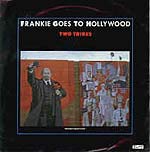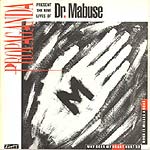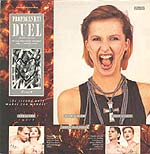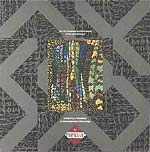The Strength To Dream | |

| I hate the word 'revival'. It's such a lazy word, and such a lazy idea. Who wants to revive when you can renew? I'm sure I don't know. I don't like nostalgia either. Wallowing in nostalgia is like sleeping in your own vomit. There's a lot of talk of a 1980s revival these days which I think is horrid because as I said revival is a hateful word and anyway such mainstream things only ever succeed in dragging up everything that was shit the first time around and letting a new generation of philistines think otherwise. It's Post-Modernism gone wrong; a trawl through history that instead of attempting fusion of the elements to create new meaning simply repeats everything verbatim. Of course you might argue that the 'Dance' artists who are remixing old '80s electropop 'classics' are making new meaning from old, but who cares when the results sound so awful? I mean, have you heard that Sash remix of OMD's 'Enola Gay'? And all those remixes of Frankie Goes To Hollywood songsÉ Was ZTT the first Post-Modern record label, a confection of deconstructed entertainment from the days (this would be the 1980's for those of you with such 'historical' minded ways of thinking and who are slow to pick up things) in which the idea of Po-Mo was at least fairly fresh and which certainly seemed to offer interesting possibility and intriguing direction? From the days before irony reared it's hideous head and destroyed all hope (which, in case you are still locked into concepts of measuring your time in a traditional, linear manner, would be the 1990's). There are sure to be discussions (not to mention dissertations) about whether Factory, or indeed Operation Twilight might lay claim to such an honour, but I think you would probably need to aver to the idea that actually Factory was one of the last gasps of the Modernist aesthetic in Popular Culture (that is Modernist as defined by Le Corbusier, the Bauhaus and those Soviet Constructivists, from whom Peter Saville developed his visual ideas so eloquently, and not Modernist as defined by targets and parkas and Lambrettas - and the connections between all of THAT someone else can write about). And Operation Twilight? Operation Twilight was a great label that couldn't decide if it wanted to be Factory, Postcard or Les Disques Crepescule and ended up falling somewhere between a rock and a hard place, and more on them in a moment. ZTT was the first record label I truly loved and which ruled my life, as such things are meant to do when you are a teenager. Actually I was only just barely a teenager (my ZTT years were when I was 18 and 19) but exactly why I was leaving my Pop Abandonment to such a late age is another story, to do with shoplifting, Grand Prix racing drivers and the black-hole of youth that is the bedroom and only the bedroom. Like I say, it's another story, and not a particularly interesting one at that, but then are stories of teenage years ever interesting? Of course they are. ZTT was always interesting. At least until it became boring, which is the way of most things, or at least is the way most things appear when you are in the habit of moving on and making new discoveries. Which is as it should be. |

| ZTT started with a Number One Single, and that's as good a place to start as any. Frankie Goes To Hollywood weren't ever the greatest band in the world, not even for the time it takes to draw a short and shallow breath, but they made some of the finest Pop Records ever. 'Relax' was contrived and calculated hedo-cynicism and it fitted in with the culture of Thatcher's Britain perfectly. From the signing-on talk at the start to the crescendo choruses of 'come', 'Relax' was an anthem of hedonistic abandonment, a withdrawal into the fantasy worlds of Sexual Release and the Pop Underground. It sounds strange to use the word 'underground' when you think of just how many copies 'Relax' ended up selling and about just how omnipresent Frankie were in the UK consciousness throughout 1984, but the fact remains that in the first instance Frankie were the fallout from the Liverpool Punk scene, fusing the artful playfulness and pretension of Big In Japan with the Hi-NRG stomp of the New York (Gay) Disco Underground. It wasn't a hit at first. At first hardly anyone wanted to know, and it was only after Radio One DJ Mike Read refused to play the single (leading to a blanket radio 1 'ban') that the record stormed the charts and the nation's consciousness. And I still refuse to believe that it all wasn't one great big planned and manipulated move by Paul Morley. Morley was the media orchestrator of ZTT. He came from the music press, in which he championed what he called a New Pop; a Pop of glamour with attitude; a Pop which fused passion with style and which sounded scratchy and infectious and that illuminated the soul with the flashlight of intellectual insight. It takes a bit of a stretch of the imagination to reconcile much of the music that Morley championed in the NME (Fire Engines, Associates, Josef K, Subway Sect, Orange Juice) and the music that the ZTT label released but stretching the imagination was always something that Morley was keen to do, so maybe it all makes sense after all. Certainly it could be difficult to see any influence of Subway Sect in Frankie Goes to Hollywood, but then that wouldn't be the point. The point would be that 'Two Tribes' was a song that shaped a summer for more people than 'Ambition' and if that's a sad thought at least it's better than the possibility of Bryan Adams doing the same. |

| Viewed through the mists of time, 'Two Tribes' seems a quaint time-capsule of the early 1980's. Its concentration on conflict between the then Superpowers of the USA and the USSR seems baffling now; the recurring theme of nuclear strikes somehow puzzling and a glance back to more innocent times. Were we REALLY so scared of the 'bomb' and did we really think that the unthinkable would happen? Of course there were also the stories that said 'Two Tribes' was in fact based on the Mad Max movies, but that seemed irrelevant when you looked at the sleeves and saw the tables of data recording the deployment of missiles and the biological effects of a 5000 megaton nuclear war, or you watched the video with the Reagan and É (the USSR leader, I cant rememberÉ does ANYone?) É grappling in a cockfight arena. Subtlety was never a Frankie watchword. Not that any of that matters of course, because what counts is that 'Two Tribes' still sounds terrific. It sounds Huge, a massive Pop record with an unstoppable momentum. A pounding bass line and snarling guitar breaks echoed by strings that sound like they are on the verge of snapping, and it seems just and right, looking back now, that the record spent an inordinate amount of time cemented at the top of the UK singles charts throughout the summer of 1984. There were a million and one remix singles, picture discs and various formats of 'Two Tribes' to purchase that summer and the cynical would make pointed criticism about rampant exploitation, and maybe they had a point, but another point might be that ZTT simply understood implicitly the nature of Pop Obsession and the importance of extending the emotional involvement. Of course Frankie were puppets and of course they, like The Spice Girls many years later, totally blew the appeal when they tried to show they were a 'real band' playing 'real' instruments and having rock'n'roll excesses to prove the point. From that moment on, (and in spite of the 'Power of Love' single being a treat for the Christmas of 1984, with it's gorgeous cardboard bag sleeve festooned with tiny crosses and hearts) from the moment they made an album that collected the singles into a pointless format and filled it out with more irrelevant cover versions and adverts for t-shirts and bags, Frankie were forgotten. |

| Propaganda were the best ZTT band. In fact Propaganda were one the very best Pop groups of the 1980s and ever. Propaganda fused experimental with noise and melody and came up with a sparkling and challenging Pop that was better than anything made by anyone else around at the time, or at any time. Like Frankie with their connections back to the Liverpool Punk and post-punk scene, Propaganda had their own intriguing reference points, mainly leading from the artful end of the industrial noise scene in Germany, where Ralf Dorper, instigator of Propaganda had been in the rated Die Krupps, and the first Propaganda single was to have been a cover version of a Throbbing Gristle song 'Discipline', appropriately re-titled 'Disziplin'. This single was to have been issued on the Operation Twilight label in 1982, and indeed the whole Operation Twilight story seems to be of unreleased material, with Virginia Astley, April Showers, the French Impressionists and Paul Haig among the artists allocated ghostlike catalogue numbers with nothing to show for it. What WAS released by operation Twilight in 1983 however was a Ralf Dorper solo single which collected four tracks from rare 7" singles released in '80 and ''81 in Germany. The first tangible Propaganda offering was the 1984 single 'Dr Mabuse', and never did darkness sound so delectable and uplifting. There is a lovely quiet start to the song, with Suzanne Freytag deadpanning 'Why does it hurt when my heart misses the beat' before some great clattering drums start up, to be joined before very long by the almost trademark bounding bass synth sound so beloved of Trevor Horn. It's all go from there on in, with broken glass and all sorts of strange scratching noises mixing in with some fantastically frenetic melodic keyboard refrains. It's a metallic industrial Pop masterpiece that still sends shivers down my spine whenever I hear it. The sleeve was great too of course. All the first wave of ZTT sleeves were great, mixing philosophy, cultural studies quotes and some fine graphics to make fitting artefacts in themselves. 'Mabuse' featured a black and white painting by Anton Corbijn, showing a hand with a large M scratched in the palm. The 'P' of Propaganda was a duelling sword, and barbed wire arced across the back of the sleeve. Photos of the band members standing in front of projection screens graced the back also, giving the impression of a gang of artful outsiders at the Cabaret Voltaire, if the Cabaret had been held in '60s New York and Warhol had set up the slide projectors. And they did a great military march version of The Velvet Underground's 'Femme Fatale' on the flip too. Of course it was all just a little too hard and strange for the average Pop consumer at the time, and the single wasn't initially a chart hit, although later, in the fever of post-Frankie stardom, it was pushed a second time (with a new black sleeve) and broke the lower reaches of the UK singles chart. For all those scratched by the intensity of Propaganda through the 'Dr Mabuse' single, there was the prospect of more in the pipeline thanks to the note on the sleeve that 'the next Propaganda single is 'Duel'.' What they didn't say was that it was going to take over a year to appear. |

| Was it worth the wait? Of course it was. 'Duel' remains one of the quintessential '80s Pop Masterpieces and is a song that retains an aura of mystery and allure impossible to grant to records that sold more at the time. Played now, so many of those '80s hits sound tame and empty, whereas 'Duel' still sounds fresh and challenging, eyes fixed on a further horizon, daring you to join in the adventure. Not many were brave enough at the time of its release and it was only a minor hit, although time, as I have said, has been kinder, and you will find the strains of 'Duel' creeping into the oddest places, usually on TV shows where those in charge are clearly of an age whereÉ well, you get the idea. There were a million versions of 'Duel' too, most circling around the concept of the rough and the smooth, the delectable and the disturbing. The 'green' side was the smooth, the 'sung' version they called 'Duel', whilst the 'red' side was the rough, the shouted version that went under the name of 'Jewel'. 'Jewel' sounded scary at the time and does so still today. It was an intense rollercoaster ride through dark metallic electroPop and I loved it and love it still. Of course there were 7" and 12" versions of both, as well as various different collages on a double pack 7" and a cassingle that I had for years but which self destructed as such things are/were apt to do. I wish I still had it because there was a great version on there as I recall, although my recall is suspect it has to be said. |

| The album A Secret Wish came out in the early summer of 1985 and of course it sounded terrific, from the opener 'Dream Within A Dream' with Suzzanne Freytag reciting an Edgar Allan Poe poem over a hypnotic beat, through 'Duel'/'Jewel' and 'Dr Mabuse' to a sparkling version of Josef K's 'Sorry For Laughing' which I know had many Josef K fans screaming 'heresy' but really they weren't Josef K fans so much as foolish luddites mourning the death of the electric guitar. Some (not least probably Paul Haig himself), of course, were if not exactly dancing on it's grave, at least smart enough to give the mourning a miss. Another single was lifted from the album, and in hindsight it was probably the best single of them all. I remember thinking at the time that 'P-Machinery' was just a bit too motorik, a bit too slick, too smart for it's own good. Certainly few people seemed to agree otherwise, as it pretty much disappeared without a trace, as indeed did my own clear vinyl 12" copy, which, like so many of my records from the time seemed to evaporate from the various houses in which it played at innumerable parties. Obviously someone somewhere liked itÉ although not enough to buy it for themselves. Listened to now, 'P-Machinery' sounds better than ever. It drives onwards with an implacable beat and the glorious chant of 'power, force, motion, drive' which seems to make as much sense in the days of techno as it ever did before. Luc Besson certainly seemed to think so, as he used it as the soundtrack at the start of his Subway movie, following Christopher Lambert in his Peugeot through the streets of Paris and eventually of course, down the steps into the Subway itself. The song never sounded better. 'P-Machinery' was a great Dance track that would have been a massive club hit in a later era (the lie to this suggestion of course was given with a '90s re-issue and remix which disappeared even more rapidly that the original did) and actually more than anything else it's true to say that Propaganda made great Dance Pop records that were way ahead of their contemporaries and of their time. Much later, when Acid House began to feed into the UK consciousness, the early DJs would drop Propaganda records in their sets, and noted Shoom impresario Danny Rampling would add a sample from 'Dream Within A Dream' into his remix of Hyponotone's excellent 'Dream Beam'. Propaganda themselves of course were no strangers to the concept of the remix and their Wishful Thinking album of late 1985 sounds as fresh and as interesting today as it ever did. |

| Wishful Thinking took tracks from A Secret Wish and gave the LP a warped, elongated, looped and deranged sidekick. Listened to now, the remixed versions sound terrific, most notably 'Laughed' which takes their version of the Josef K classic 'Sorry For Laughing' and turns it into nearly nine minutes of driving beats and electronic tomfoolery that ends up sounding like you imagine Paul Haig would have liked it to sound in the first instance. Or at least as Haig would have treated it in his Rhythm Of Life phase, and in fact it's clear in hindsight that Propaganda were travelling similar roads to Haig and his ROL all along. Like Frankie, it didn't matter one bit whether Propaganda could 'cut it live', but with their Outside World tour they played one of the best shows I have ever seen. The core of the band were joined by Kevin Armstrong (fresh from contributing to the Prefab Sprout Steve McQueen album) on guitar, and the recently departed rhythm section from Simple Minds, Derek Forbes and Brian McGee. It's very easy to remember Simple Minds as only the dreadful parody of a Stadium Rock Band that they grew into, but it has to be recalled that initially they made some strange and peculiar records that crossed the boundaries between post-punk and the euro-chic of Kraftwerk. Central to this were Forbes and McGee, driving forward the records with a supine, powerful but restrained and metronomic rhythm. It all sounded best, naturally, when Jim Kerr was left out of the mix, and the instrumental Sisters Feelings Call is one of the finest '80s electropop records. Simple Minds loss was Propaganda's gain, and for this short tour, the band were the best thing going. Thankfully, there were no more tours with any other line-ups to dull the edge of the memory. |

| There was more to the story of ZTT at this time of course. Art of Noise made perhaps the most lastingly influential records of the entire decade, and certainly many contemporary Techno artists will still namecheck Kraftwerk and Art Of Noise (and very few others) as influences. For sure the early Art of Noise records were strange, demented sounding records and of course they were terrific. There was also Andrew Poppy, who made two great LPs for the label that were completely ignored; Anne Pigalle who had a peculiar Parisian caf torch singer act and who was frankly forgettable, and the very odd Instinct who had one track on a compilation LP (the Value of Entertainment collection - they also appeared quite prominently on the same titled video) and then vanished. Instinct featured three former members of Pigbag, and aside from that very little else is known, aside from the fact that they really did not sound very good at all. Frankie Goes To Hollywood of course continued to make hit records with and without the majority of the band, and Holly Johnson had a fairly lucrative solo career. Propaganda disappeared for years under the pressure of legal wrangles, and appeared with an LP 1,2,3,4 in 1989. It was a terrible anti-climax, and somehow the inclusion of one Howard Jones on the record (a man Paul Morley once suggested was intrinsically less interesting than a spanner) spoke volumes. Claudia Brucken had of course stayed with ZTT (and then husband Morley) and had made records with Thomas Leer under the name Act, but that's another story. Also another story, and one unlikely to be written it has to be admitted, is that of Das Psych Oh! Rangers, the band touted by ZTT for a month as the next Frankie. They had one appalling single, the 'Essential Art of Communication' that was sub-Sigue Sigue Sputnik and promptly vanished. Somehow they, more than anything else, symbolised the slide in importance and credibility of ZTT, and made it clear for a lot of people that it was time to move on. ZTT themselves moved onto more cult and then chart success with prime Acid pioneers 808 State, although by then Morley was not involved, and had gone onto more journalism and TV presentation. As for revivals, well I'd hate for anyone to be reading this and contemplating it all as part of some strange package saying how fantastic the '80s were. Like any moment in time, there was good and there was bad, and although in some respects it helps to make a sense of an artefact to place it within that historical context, it also makes nonsense of the very same artefact to keep it cosseted within that context. The best moments make a sense regardless of time, continue to create meaning and mean something in the lives of those who stumble upon them. And if ZTT and those Propaganda and Frankie Goes to Hollywood records stand for anything then it is surely for that. © Alistair Fitchett 2000 |